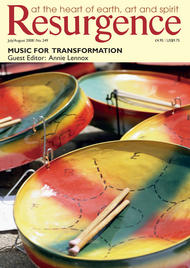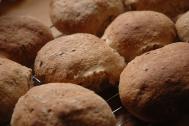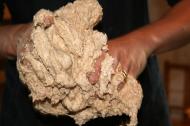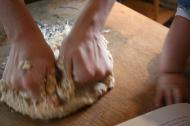"It's easy to make proper bread if you give it time."
Bread is life. Literally, in the sense that, properly made, it has what organic pioneer George Stapledon called 'the ability to enliven'; symbolically, in that it stands for all food.
In the days before commercial yeast, almost all bread was fermented (allowed to rise) for many hours, often overnight. The so-called Chorleywood Bread Process, invented in the 1960s, used high-energy mixers and a slew of chemicals like potassium bromate (now banned because it was found to cause cancer) and chlorine bleach (also now banned) to make a very white loaf in double quick time. It was cheap, but not necessarily cheerful, because we now know that in baking, time is of the essence.
Only if you let dough ferment for long enough can naturally occurring beneficial bacteria work to make the bread more digestible, nutritious and tasty. Most British bread - even the types fortified with supposedly 'healthy' additions - is made far too quickly for these bacteria to have a chance.
In the 1990s a whole new type of enzyme-based 'improvers' replaced the banned chemical additives. You won't know they are there because the law says that as 'processing aids' they don't need to be declared on the label. We may not mind that the squishy texture of much modern bread is marketed as 'freshness'. But we would do well to ponder what bread, engineered to stay soft for weeks, may be doing to our insides.
We need to reclaim the staff of life from those who profit by selling it to us without admitting what's in it. Some people are already doing this, taking control over an important part of their diet, and giving joy to themselves and those around them, by making bread slowly with their own hands.
Here is the recipe for the wholemeal baps that were one of the most popular items I made at The Village Bakery that I started in the 1970s. A little preparation on Saturday evening, a slow rise on Sunday - and by lunchtime you'll be enjoying the tastiest rolls you've ever made.
Recipe
Baps (using an overnight sponge)
Although they need a long rise, these baps don't take any more of the baker's time than fast-made bread. They use less yeast, too, and the long fermentation gives great flavour and additive-free keeping quality. This recipe makes a dozen baps or, if you prefer, two small loaves.
Note: 1 millilitre of water weighs one gram. If you have a set of digital scales, it is often easier to weigh small amounts of liquid than to measure them in a jug.
1. The Saturday night sponge
5 g Fresh yeast (or 3 grams dried yeast)
130 g Water (at about 20°C)
150 g Stoneground wholemeal flour
285 g Total
Dissolve the yeast in some of the water and add it to the flour with the rest of the water. Mix until the dough has 'cleared', i.e. all the ingredients are thoroughly combined. There is no need to knead the sponge, since time will develop the gluten sufficiently.
Put the sponge in a bowl large enough to allow it to expand to at least three times its original size. Cover with a lid or polythene bag and leave it at room temperature for 12-18 hours.
2. The Sunday morning dough
285g Overnight sponge (from above)
450g Flour (wholemeal or a mix of white and wholemeal)
5g Salt
270g Water (warm to the hand, i.e. 30-35°C)
15g Butter or olive oil (optional but makes rolls softer)
1025g Total
Before you do anything else, take the lid or cover off your sponge and enjoy a first whiff of the fruity, beery, slightly vinegary aroma.
Mix all the ingredients together into a soft dough. Knead without adding extra flour until it is stretchy. Cover and leave to rise for 1 hour. Divide into 12 pieces (or two if you are making small loaves) shape into rolls, dip into wholemeal flour to get a good covering and place on a baking tray with about 2 cm separating them. Cover with a large polythene bag but don't let it touch the rolls. Let them rise until they are just touching each other, then bake in a hot oven (220°C) for 10-15 minutes, depending on your oven. They should have a thin floury crust and feel soft after they have cooled.
© Andrew Whitley 2008
Andrew is running a baking course at Schumacher College from 17th - 21st November 2008 as part of the Real Food, Slow Food week. For further information or to book a place, visit www.schumachercollege.org.uk
Andrew is also helping start a Real Bread Campaign to increase the enjoyment, production and consumption of bread made with natural ingredients, appropriate fermentation and no adulterants, so that good bread may play a larger part in the physical, mental and social wellbeing of the nation. www.realbreadcampaign.org










